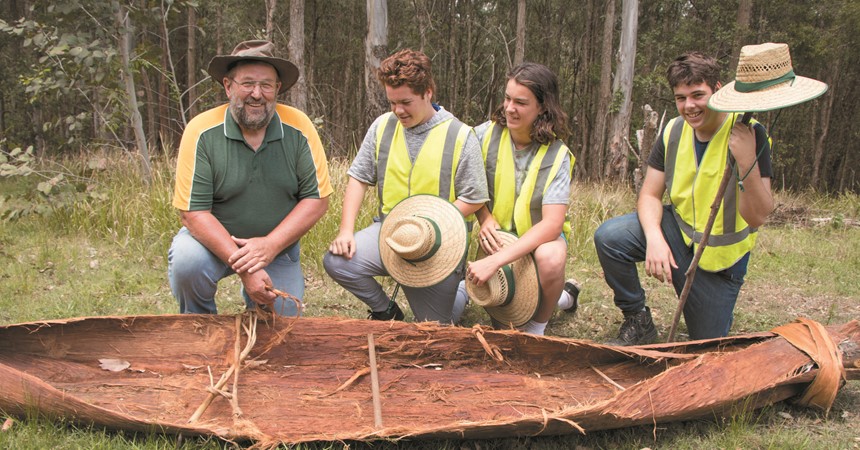This was the first step toward providing tailored learning programs for Aboriginal & Torres Strait Islander students in Lake Macquarie and catering for young Aboriginal people who find themselves disengaged at school or unable to succeed in mainstream learning environments.
On 5 May 2015, the Catholic Schools Office officially opened a $6.9 million cluster Trade Training Centre (TTC) which included St Francis Xavier’s College, Hamilton, as the lead school of the cluster group and St Paul’s, Booragul, San Clemente, Mayfield, St Pius X, Adamstown, St Mary’s Catholic College, Gateshead, and the Yula-Punaal Centre. Unlike schools which focused on establishing TTCs around the delivery of Hospitality and Building and Construction, the unique partnership with the Yula-Punaal Centre allowed for the development of this TTC facility at Mandalong offering skills development for indigenous students, especially in Land Management and Horticulture. It was also a practical way of ensuring young people gain the skills they need to reach their potential.
Since its establishment, over 30 Aboriginal and non-Aboriginal students from the Dioceses of Maitland-Newcastle and Broken Bay have participated in the Aboriginal Land Management and Cultural Immersion Program. Students travel to Mandalong weekly to gather and learn at Yula-Punaal. The program provides students with a strong sense of belonging through cultural connections and also enables them to develop competencies in the RTO Certificate II in Conservation and Land Management. Students are taught practical skills − how to build a campsite area with fire pit, identify weeds and plants, make walking trails, work with machinery and tools, including the ride-on mower, and drive best practice work health and safety. Yula-Punaal also acts as something of a spiritual getaway to students who struggle at school.
CSO Education Officer and one of those who established the Centre, Tammy Carney-Wright, says that the program provides all students with the opportunity to learn new skills, make new friends and connect to ‘Country’.
“Students of all backgrounds are thriving in this program,” says Tammy.
“We’re not only providing the opportunity for a deeper understanding and appreciation of conservation and preservation of land management and all that it involves, but also providing students who may be struggling in mainstream classes with an opportunity to take time out and find their confidence.
“This year, I have seen one student in particular thrive in all aspects of life under this program. Students who were once struggling at school and socially are now topping their subjects. They’re like new people because they have finally found their confidence.”
The program has also acted as a lifeline for students who suffer from anxiety and who become overwhelmed at school.
“Being here, students see a different side to things. I have seen some students get so worked over what is expected at school, but here they can take time out to focus on Country, friendships and the spiritual side of things. It makes such a difference to the other areas of their lives,” says Tammy.
Recently seven students from Years 9 and 10 at St Pius X, St Paul’s and St Mary’s were presented with Statements of Attainment outlining key competencies achieved from the Certificate II in Conservation and Land Management. Those students who wish to remain for another year will finish at Yula-Punaal in 2018 with a completed Certificate II in Conservation and Land Management. Students who don’t wish to complete a Certificate II will still be awarded a Certificate of Participation with achievements listed, so no matter their goals, students are always working toward competencies.
Conservation and land management are integral parts of Yula-Punaal, as is the traditional way the Ancestors looked after the land or ‘Country’, the cultural term used when talking about Aboriginal land. Tammy explains that we all have a responsibility and obligation to conserve and maintain places of significance.
“That’s what we want this place to be about – a place of learning, culturally and educationally, preserving and conserving our environment and encouraging native flora and fauna.”
Although students do not need to be of Aboriginal heritage to be a part of the Yula-Punaal program, cultural identity is a key element. Tammy has witnessed the pride and confidence Aboriginal students gain from positive learning that relates to cultural identity and the way in which it re-affirms, acknowledges and promotes cultural diversity.
As for the future, Tammy is dreaming big.
“My vision for Yula-Punaal is to have full-time courses and utilise our classroom and land to the max. The program is just such a great opportunity for students and the difference we are making in the lives of these students is really being recognised – teachers are really seeing value in the program,” says Tammy.
To learn how your child can be involved (if you reside within the Lake Macquarie/Newcastle area), please contact your local Catholic high school, www.mn.catholic.edu.au.























































































